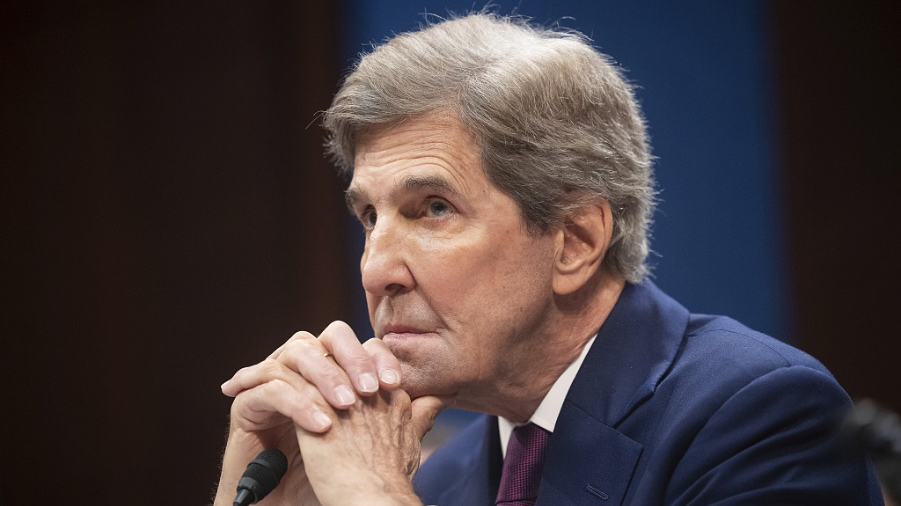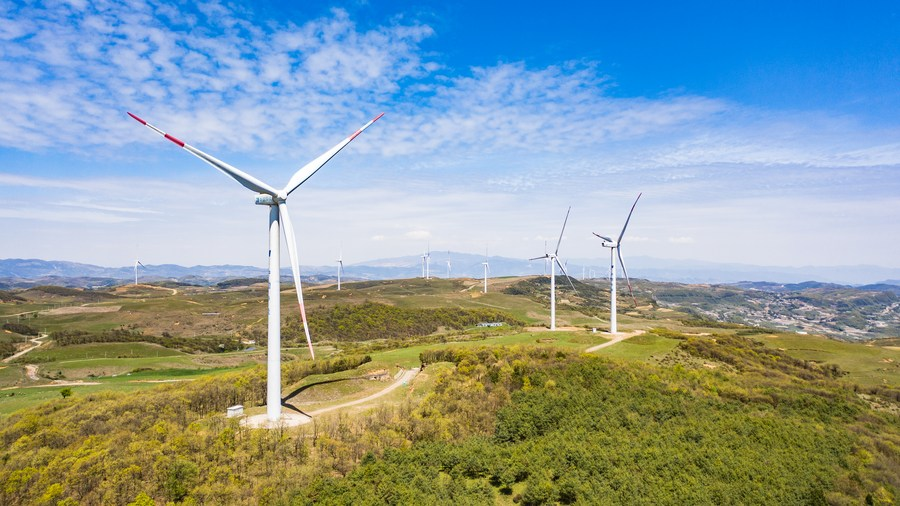
U.S. Special Presidential Envoy for Climate John Kerry testifies before the House Foreign Affairs Subcommittee on Oversight and Accountability on Capitol Hill in Washington, D.C, the U.S., July 13, 2023. /VCG
U.S. Special Presidential Envoy for Climate John Kerry testifies before the House Foreign Affairs Subcommittee on Oversight and Accountability on Capitol Hill in Washington, D.C, the U.S., July 13, 2023. /VCG
Editor's note: Bradley Blankenship, a special commentator on current affairs for CGTN, is a Prague-based American journalist, political analyst, and freelance reporter. The article reflects the author's opinions and not necessarily the views of CGTN.
U.S. Special Presidential Envoy for Climate John Kerry arrived for talks with his Chinese counterpart in Beijing on July 16. During the lead-up to the hotly anticipated meeting, Kerry was assailed by members of the opposition Republican Party for being too soft on China, which they labeled "the world's biggest polluter." Kerry also, according to reports, ruled out a plan to pay into a global fund for poorer nations ravaged by climate change "under any circumstances."
According to a section of the Western media, the preceding events leading up to Kerry's visit indicate a lack of substantial progress and, indeed, a heightened potential for confrontation. But this would be a misguided route for Kerry for a few reasons. For one, the framing of China as the biggest polluter by the GOP is misleading; since 1750, the United States has produced over 400 billion metric tons of cumulative carbon dioxide emissions. This dwarfs China's total contribution. So in terms of historical emissions, which are a far more important and relevant metric when assessing culpability, Washington is much more responsible.
David Fishman, an American energy expert based in Shanghai, illustrated today the incongruence between American and Chinese consumers in a recent poll. He asked Twitter users how much energy the average American household consumes compared to those in China, and the answer was about 5 times more. Of course, China's and the U.S.'s industrial capacity is massive and a large percentage of their emissions are from companies, but this figure shows that there are deep inefficiencies and an obvious lack of regulations in the United States.
At the same time, China has already committed to peaking out its carbon emissions by 2030 and achieving carbon neutrality by 2060. The administration of U.S. President Joe Biden has planned to achieve this goal by 2050 — but political instability, plus the inevitably that a Republican president will disrupt this plan given that the party doesn't understand climate change, will ensure this will not happen. There is no law or set policy which will actually see this to fruition. As it stands, U.S. regulatory agencies have been gutted by the Supreme Court to the point that a law from Congress — a bitterly divided institution nearly incapable of basic governance in this day and age — is the prerequisite for any meaningful curb emissions.

Wind turbines in Weining County, southwest China's Guizhou Province, April 27, 2022. /Xinhua
Wind turbines in Weining County, southwest China's Guizhou Province, April 27, 2022. /Xinhua
For Kerry to have any significant breakthrough in this meeting, first of all, requires from him a lack of finger-wagging over emissions. If Republicans say he is too soft on China on climate, this is a problem of their extraordinary ignorance. China is a world leader in green energy, is quickly developing its green sector to meet the issue of climate change and has set achievable goals to reduce emissions. There's no point in harping on this issue to officials in Beijing when it is the U.S. lagging far behind the rest of the world.
Secondly, Kerry should adhere to the China-U.S. Joint Glasgow Declaration on Enhancing Climate Action that was signed in Glasgow in 2021. The two sides agreed at that time on their intended cooperation in reducing methane and carbon dioxide emissions; cooperating on regulatory schemes and maximizing the social benefits of the clean energy transition; and upholding a number of existing agreements and multilateral frameworks, as well as the aforementioned climate reparations.
For Kerry to suggest he wouldn't adhere to the latter idea even before arriving in Beijing even though the two sides already agreed to it is a very serious mistake. As one of the leaders in historical emissions, the U.S. owes it to those most-impacted countries to help them develop emergency infrastructure to meet climate disasters. This is a serious issue that will pose threats to global security, and most experts agree will create a global humanitarian crisis as climate refugees become the norm. The U.S., as the world's largest economy, has a responsibility to lead on this issue and show that no person should be left to fight a global, existential battle like climate change alone.
(If you want to contribute and have specific expertise, please contact us at opinions@cgtn.com. Follow @thouse_opinions on Twitter to discover the latest commentaries in the CGTN Opinion Section.)